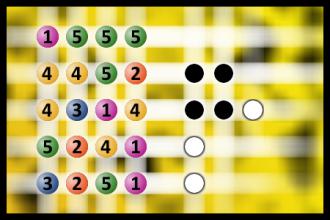Which is a winning combination of digits?
The computer chose a secret code (sequence of 4 digits from 1 to 6). Your goal is to find that code. Black circles indicate the number of hits on the right spot. White circles indicate the number of hits on the wrong spot.Correct answers: 52
The first user who solved this task is James Lillard.
#brainteasers #mastermind

Honey, said this husband to his wife...
"Honey," said this husband to his wife, "I invited a friend home for supper."
"What? Are you crazy? The house is a mess, I didn't go shopping, all the dishes are dirty, and I don't feel like cooking a fancy meal!"
"I know all that."
"Then, why did you invite a friend for supper?"
"Because the poor guy is thinking about getting married."
"What? Are you crazy? The house is a mess, I didn't go shopping, all the dishes are dirty, and I don't feel like cooking a fancy meal!"
"I know all that."
"Then, why did you invite a friend for supper?"
"Because the poor guy is thinking about getting married."

